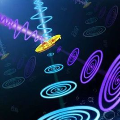This paper exploits the potential of edge intelligence empowered satellite-terrestrial networks, where users' computation tasks are offloaded to the satellites or terrestrial base stations. The computation task offloading in such networks involves the edge cloud selection and bandwidth allocations for the access and backhaul links, which aims to minimize the energy consumption under the delay and satellites' energy constraints. To address it, an alternating direction method of multipliers (ADMM)-inspired algorithm is proposed to decompose the joint optimization problem into small-scale subproblems. Moreover, we develop a hybrid quantum double deep Q-learning (DDQN) approach to optimize the edge cloud selection. This novel deep reinforcement learning architecture enables that classical and quantum neural networks process information in parallel. Simulation results confirm the efficiency of the proposed algorithm, and indicate that duality gap is tiny and a larger reward can be generated from a few data points compared to the classical DDQN.
翻译:暂无翻译




